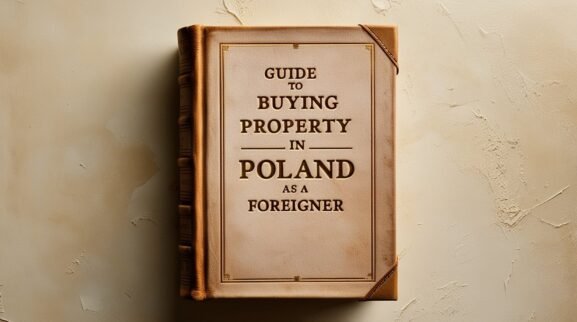How to Buy Real Estate Property in Poland
If you’re looking for a new home or investment opportunity, you’re not alone. Poland has been gaining a lot of attention in recent years.
The economy is stable, prices (while rising) are still competitive compared to Western Europe, and the country’s rich history and vibrant cities make it a great place to settle down or invest.
That said, buying real estate property in Poland isn’t as straightforward as it might be in other countries.
As someone who’s helped guide folks through the Polish property market, I’m here to break it down for you. From legal requirements for foreign buyers to the best ways to find your dream home or investment, we’ll walk through everything step by step.
Step 1: Understand the Rules for Foreign Buyers
Good news for most: Poland allows foreigners to purchase property, but there are a few details to be aware of.
If you’re an EU or EEA citizen, you can buy property without too many hurdles. Non-EU citizens, however, might need a special permit if they’re looking to buy land or certain types of properties (think agricultural or forested areas).
The permit process might sound intimidating, but it’s manageable with the right help. Honestly, this is where a good local real estate agent can be a lifesaver. They’ll know exactly what’s needed and how to cut through the red tape. And trust me, having someone on the ground who knows the system can make all the difference.
Step 2: Budget and Financing
Now that you know you can buy property, it’s time to talk money. Property prices in Poland vary widely depending on the city and type of property.
Warsaw? Expect to pay more. Smaller cities and towns? You’ll find some real bargains. But no matter where you’re looking, it’s crucial to figure out your budget first.
Read Also: Affordable Cities in Poland for First-Time Home Buyers
Getting a Mortgage in Poland
If you’re planning to finance your purchase with a mortgage, Polish banks are generally open to lending to foreigners. But here’s the catch: they’ll want to see a solid financial history.
You’ll need to prove your income, provide some financial documentation, and be prepared for a bit of back and forth. Down payments usually start at around 10–20% of the property price, and interest rates can vary, so it’s worth shopping around.
A mortgage broker can help you find the best deal, especially if you’re navigating the process in a language you’re not 100% fluent in.
Step 3: Choose the Right Location
Each city in Poland has its own vibe and advantages, so you’ll want to pick a spot that aligns with your lifestyle or investment goals.
Hot Cities to Consider:
- Warsaw: Poland’s capital. The real estate market here is booming. Just know you’ll pay more here than in other cities.
- Kraków: A bit more laid-back than Warsaw but still a strong investment. It’s a cultural hub and a big draw for tourists, so if you’re thinking about rental properties, Kraków is a solid bet.
- Gdańsk: Want a place by the water? Gdańsk is a coastal city with a thriving real estate market, offering both affordable properties and strong investment potential.
If you’re after something a little quieter or cheaper, smaller cities or suburban areas offer great deals. You’ll get more bang for your buck without sacrificing too much on amenities or convenience.
Step 4: Get Good Real Estate Agent
I cannot stress this enough: find a good real estate agent. Especially if you’re new to the Polish market, an experienced agent can help you avoid the common pitfalls. They know the neighborhoods, the going rates, and the hidden gems that you might not come across on your own.
If you’re working with a category listing of realtors, look for those who specialize in helping foreigners or first-time buyers. These agents will not only find you great properties but will also make sure the process is smooth.
A solid real estate agent is worth every penny, trust me on this.
Step 5: The Buying Process – Step by Step
Okay, so you’ve found a property you love. What happens next? The buying process in Poland is pretty straightforward but has its quirks. Let’s break it down:
- Preliminary Agreement: You’ll sign a preliminary agreement (umowa przedwstępna) with the seller, which locks in the deal. At this stage, you’ll pay a deposit, typically around 10% of the property’s value. If either party backs out, this deposit can either be forfeited or doubled back, depending on the circumstances.
- Final Agreement: Once financing and any legal checks are sorted, you’ll sign the final agreement. This has to be done in front of a notary, who’ll ensure the transaction is legal and binding.
- Land Registry: After the sale, the property is registered in the land and mortgage register (Księgi Wieczyste). This step is handled by your notary, and it makes your ownership official.
Step 6: Don’t Forget About Additional Costs
It’s easy to focus on the price of the property itself, but don’t forget about the additional costs that come with buying real estate property in Poland. Here’s a quick rundown of what to expect:
- Notary Fees: Notary fees are around 1–2% of the property’s value. The notary is essential for making the sale legally binding.
- Taxes: If you’re buying a new property, you’ll need to pay VAT, which is either 8% or 23%. For second-hand properties, there’s a 2% transfer tax.
- Real Estate Agent Fees: Agents usually charge around 2–3% of the purchase price as their commission.
It’s always better to overestimate your costs upfront so you don’t get caught off guard later on.
Final Thoughts
Buying real estate property in Poland is totally doable, even for foreigners – it’s all about preparation. knowing the rules, having a budget, and working with experienced professionals.When you’re ready, don’t hesitate to check out our category listings of realtors.



